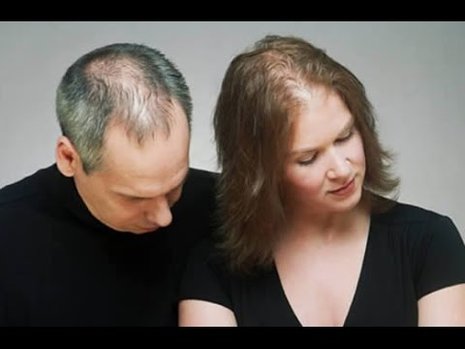Pattern hair loss could be due to gut bacteria

The bacteria that live in our gut play an important role for our health, especially for a healthy gastrointestinal tract.
Microorganisms have a huge toolbox available in the form of enzymes, which they use to break down food. This produces vital micro-nutrients, which our bodies would otherwise struggle to access, such as biotin, vitamin K, B12, niacin, and folic acid.
Biotin is a vitamin (vitamin B7) found in mushrooms and soybeans. If we don't get enough of it, it can lead to skin disease and hair loss. Some of our gut bacteria can also produce biotin, while other bacteria break down accessible biotin and consume it. Biotin deficiency is most often seen in patients with serious conditions, such as celiac disease, but it can also be common among pregnant women.
Bacteria-free mice went bald
Previous research has shown that bacteria-free mice that lack biotin in their diet, develop mild hair loss (alopecia). So scientists wanted to know whether the underlying cause was an imbalance of our gut bacteria.
A team of Japanese scientists looked into it and have published their results in the scientific journal Cell Reports.
They thought that the difference between biotin-producing and biotin-eating bacteria would reveal how much free biotin is available for the development of skin, hair, and nails.
They gave laboratory mice a diet with and without biotin, and saw no impact on hair loss as shown in the image (right).
They then repeated the experiment, only this time they also gave the mice a long course of antibiotics to destroy the balance of bacteria in their gut. This time they observed a mild hair loss, as expected, and as previously shown in bacteria-free mice.
By studying what had happened in the gut bacteria of these mice, the scientists discovered that a particular type of lactic acid bacteria, Lactobacillus murinus, had expanded after the antibiotic treatment.
This bacteria couldn't produce biotin and was a clear candidate as the cause of biotin deficiency that then led to then hair loss.
Hair loss can be stopped
To test this idea further, the scientists repeated the original experiment with bacteria-free mice.
When they fed the bacteria-free mice with Lactobacillus murinus they saw that the hair loss became even worse and the mice became almost entirely bald.
They ran control tests, feeding regular mice and bacteria-free mice a regular diet with normal levels of biotin but added Lactobacillus murinus. These mice suffered no hair loss at all.
They were also able to stop hair loss with direct injections of biotin. Although, they couldn't rule out the possible influence of bacteria from their skin could also play a role.
Demonstrating that gut bacteria along with diet influences hair loss opens up new opportunities to treat baldness and hair loss in general by manipulating the composition of our gut microbiota.
For example, a probiotic dietary supplement could be designed to alter the composition of bacteria in the gut and inhibit the biotin-eating bacteria that we now know cause hair loss.
https://medicalxpress.com/news/2018-05-pattern-hair-loss-due-gut.html
Microorganisms have a huge toolbox available in the form of enzymes, which they use to break down food. This produces vital micro-nutrients, which our bodies would otherwise struggle to access, such as biotin, vitamin K, B12, niacin, and folic acid.
Biotin is a vitamin (vitamin B7) found in mushrooms and soybeans. If we don't get enough of it, it can lead to skin disease and hair loss. Some of our gut bacteria can also produce biotin, while other bacteria break down accessible biotin and consume it. Biotin deficiency is most often seen in patients with serious conditions, such as celiac disease, but it can also be common among pregnant women.
Bacteria-free mice went bald
Previous research has shown that bacteria-free mice that lack biotin in their diet, develop mild hair loss (alopecia). So scientists wanted to know whether the underlying cause was an imbalance of our gut bacteria.
A team of Japanese scientists looked into it and have published their results in the scientific journal Cell Reports.
They thought that the difference between biotin-producing and biotin-eating bacteria would reveal how much free biotin is available for the development of skin, hair, and nails.
They gave laboratory mice a diet with and without biotin, and saw no impact on hair loss as shown in the image (right).
They then repeated the experiment, only this time they also gave the mice a long course of antibiotics to destroy the balance of bacteria in their gut. This time they observed a mild hair loss, as expected, and as previously shown in bacteria-free mice.
By studying what had happened in the gut bacteria of these mice, the scientists discovered that a particular type of lactic acid bacteria, Lactobacillus murinus, had expanded after the antibiotic treatment.
This bacteria couldn't produce biotin and was a clear candidate as the cause of biotin deficiency that then led to then hair loss.
Hair loss can be stopped
To test this idea further, the scientists repeated the original experiment with bacteria-free mice.
When they fed the bacteria-free mice with Lactobacillus murinus they saw that the hair loss became even worse and the mice became almost entirely bald.
They ran control tests, feeding regular mice and bacteria-free mice a regular diet with normal levels of biotin but added Lactobacillus murinus. These mice suffered no hair loss at all.
They were also able to stop hair loss with direct injections of biotin. Although, they couldn't rule out the possible influence of bacteria from their skin could also play a role.
Demonstrating that gut bacteria along with diet influences hair loss opens up new opportunities to treat baldness and hair loss in general by manipulating the composition of our gut microbiota.
For example, a probiotic dietary supplement could be designed to alter the composition of bacteria in the gut and inhibit the biotin-eating bacteria that we now know cause hair loss.
https://medicalxpress.com/news/2018-05-pattern-hair-loss-due-gut.html

